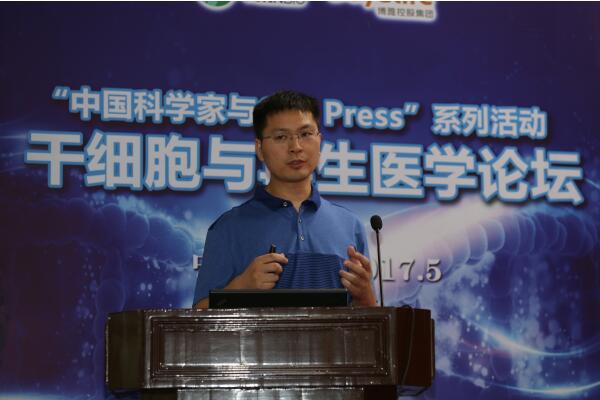李偉,博士,研究員,中國科學院動物研究所幹細胞與生殖生物學國家重點實驗室副主任。2006年畢業於武漢大學獲學士學位,2012年獲中國科學院大學理學博士學位。主要從事幹細胞和基因組穩定性研究,在幹細胞的建立和套用,以及動物基因工程方面取得多項進展,相關成果以第一或通訊作者發表在Nature,Cell, Nature Biotechnology等刊物,共發表SCI論文40餘篇。
基本介紹
個人簡介

獎項榮譽
研究領域
社會任職
科研項目
代表論著
- Teng F#, Li J#, Cui T#, Xu K, Guo L, Gao Q, Feng G, Chen C, Han D, Zhou Q*,Li W*. Enhanced mammalian genome editing by new Cas12a orthologs with optimized crRNA scaffolds.Genome Biology.2019 Feb 5;20(1):15.
- Li Y#, Wang L#, Zhang L#, He Z#, Feng G, Sun H, Wang J, Li Z, Liu C, Han J, Mao J, Li P, Yuan X, Jiang L, Zhang Y, Zhou Q*,Li W*. Cyclin B3 is required for metaphase to anaphase transition in oocyte meiosis I.Journal of Cell Biolology.2019 DOI: 10.1083/jcb.201808088.
- Wang J#, Wang L#, Feng G#, Wang Y#, Li Y, Li X, Liu C, Jiao G, Huang C, Shi J, Zhou T, Chen Q, Liu Z,Li W*, Zhou Q*. (2018) Asymmetric Expression of LincGET Biases Cell Fate in Two-Cell Mouse Embryos.Cell2018 Dec 13;175(7):1887-1901.
- Teng F#, Cui T#, Feng G, Guo L, Xu K, Gao Q, Li T, Li J, Zhou Q,Li W*. Repurposing CRISPR-Cas12b for mammalian genome engineering.Cell Discovery.2018 Nov 27;4:63.
- Zhang W#, Wan H#, Feng G#, Qu J#, Wang J, Jing Y, Ren R, Liu Z, Zhang L, Chen Z, Wang S, Zhao Y, Wang Z, Yuan Y, Zhou Q,Li W*, Liu G*, Hu B*. SIRT6 deficiency results in developmental retardation in cynomolgus monkeys.Nature560(7720):661-665.
- Li ZK#, Wang LY#, Wang LB#, Feng GH#, Yuan XW#, Liu C, Xu K, Li YH, Wan HF, Zhang Y, Li YF, Li X,Li W*, Zhou Q*, Hu BY*. (2018) Generation of Bimaternal and Bipaternal Mice from Hypomethylated Haploid ESCs with Imprinting Region Deletions.Cell Stem Cell23(5):665-676.
- Wang X#, Li T#, Cui T#, Yu D#, Liu C#, Jiang L, Feng G, Wang L, Fu R, Zhang X, Hao J, Wang Y, Wang L, Zhou Q*,Li W*, Hu B*. (2018) Human embryonic stem cells contribute to embryonic and extraembryonic lineages in mouse embryos upon inhibition of apoptosis.Cell Research.28(1):126-129.
- Xu K#, Yang Y#, Feng GH#, Sun BF#, Chen JQ#, Li YF, Chen YS, Zhang XX, Wang CX, Jiang LY, Liu C, Zhang ZY, Wang XJ, Zhou Q*, Yang YG*,Li W*. (2017) Mettl3-mediated m6A regulates spermatogonial differentiation and meiosis initiation.Cell Research.27(9):1100-1114. (Cover story)
- Li W*, Zhou Q. (2017) New stem cell types for versatile applications.National Science Review4(4):528-530.
- Li X#, Cui XL#, Wang JQ#, Wang YK, Li YF, Wang LY, Wan HF, Li TD, Feng GH, Shuai L, Li ZK, Gu Q, Hao J, Wang L, Zhao XY, Liu ZH, Wang XJ,Li W*, Zhou Q*. (2016) Generation and application of mouse-rat allodiploid embryonic stem cells.Cell164(1-2):279–292.
- Wan HF#, Feng CJ#, Teng F#, Yang SH#, Hu BY, Niu YY, Xiang P, Fang WZ, Ji WZ,Li W*, Zhao XY*, Zhou Q*. One-step generation of p53 gene biallelic mutant Cynomolgus monkey via the CRISPR/Cas system.Cell Research. (2015) 25(2):258-261.
- Li W#, Li X#, Li TD#, Jiang MG#, Wan HF, Luo GZ, Feng CJ, Cui XL, Teng F, Yuan Y, Zhou Q, Gu Q, Shuai L, Sha JH, Xiao YM, Wang L, Liu ZH, Wang XJ, Zhao XY, Zhou Q*. Genetic modification and screening in rat using haploid embryonic stem cells.Cell Stem Cell. (2014) 14(3):404-414
- Li W#, Teng F#, Li T, Zhou Q*. Simultaneous generation and germline transmission of multiple gene mutations in rat using CRISPR-Cas systems.Nature Biotechnology.(2013) 31:684–686.
- Li W#, Shuai L#, Wan H#, Dong M#, Wang M, Sang L, Feng C, Luo GZ, Li T, Li X, Wang L, Zheng QY, Sheng C, Wu HJ, Liu Z, Liu L, Wang L, Wang XJ, Zhao XY*, Zhou Q*. Androgenetic haploid embryonic stem cells produce live transgenic mice.Nature(2012) 490(7420):407-411.
- Li W#, Zhao XY#, Wan HF, Zhang Y, Liu L, Lv Z, Wang XJ, Wang L*, Zhou Q*. iPS cells generated without c-Myc have active Dlk1-Dio3 region and are capable of producing full-term mice through tetraploid complementation.Cell Research.(2011) 21(3):550-553.
- Zhao XY#,Li W#, Lv Z#, Liu L, Tong M, Hai T, Hao J, Guo CL, Ma QW, Wang L, Zeng F*, Zhou Q*. iPS cells produce viable mice through tetraploid complementation.Nature(2009) 461(7260):86-90.

